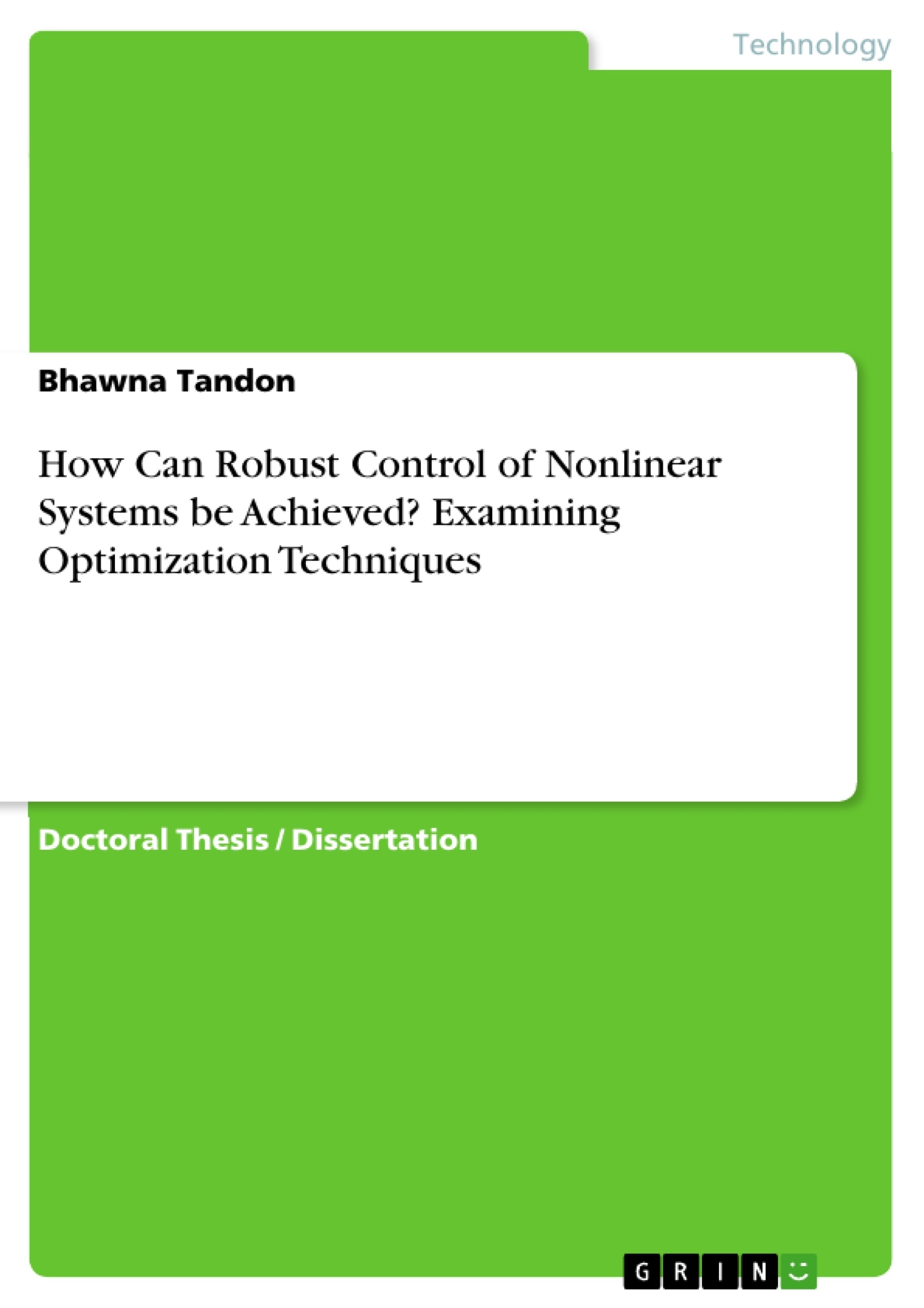The following text examines the questions, how nonlinear system can better be controlled by new optimisation techniques such as feedback linearization.
Due to the inevitable nonlinearities in real systems, several nonlinear control methods like feedback linearization, sliding mode control, backstepping approach and further modes are described in detail in the literature. Due to limitations in application of well known classical methods, researchers have struggled for decades to realize robust and practical solutions for nonlinear systems by proposing different approaches or improving classical control methods.
The feedback linearization approach is a control method which employs feedback to stabilize systems containing nonlinearities. In order to accomplish this, it assumes perfect knowledge of the system model to linearize the input-output relationship. In the absence of perfect system knowledge, modelling errors inevitably affect the performanceof the feedback controller. Many researchers have come up with a new form of feedback linearization, called robust feedback. This method gives a linearizing control law that transforms the nonlinear system into its linear approximation around an operating point. Thus, it causes only a small transformation in the natural behavior of the system, which is desired in order to obtain robustness.
The controllers are required to provide various time domain and frequency domain performances while maintaining sufficient stability robustness. In this regard, the evolutionary optimization techniques provide better option as these are probabilistic search procedures and facilitate inclusion of wide variety of time and frequency domain performance functionals in the objective functions. A significant scope of work remains to be done which provides motivation for the research in the design of robust controllers using evolutionary optimization. Also, emerging techniques using LMI also find potential in controller design for feedback linearized systems.The thrust of the study here is to design robust controllers for nonlinear systems using Evolutionary optimization and LMI.
Furthermore, latest control methods for nonlinear system have been studied, deeply, in this thesis. Combining feedback linearization with non linear disturbance observer based control (NDOBC) obtains promising disturbance rejection and reference tracking performance as compared to other robust control methods.
Inhaltsverzeichnis (Table of Contents)
- CHAPTER 1
- Introduction
- Background
Zielsetzung und Themenschwerpunkte (Objectives and Key Themes)
This thesis focuses on the design of robust controllers for nonlinear systems using evolutionary optimization techniques and Linear Matrix Inequalities (LMIs). The work explores the limitations of classical control methods for nonlinear systems and investigates how feedback linearization, a technique for transforming nonlinear systems into linear ones, can be made more robust against uncertainties and disturbances. The thesis also examines the application of nonlinear disturbance observer-based control (NDOBC) and sliding mode control (SMC) for enhanced performance and robustness.
- Robust control of nonlinear systems
- Feedback linearization and its limitations
- Evolutionary optimization techniques for controller design
- Nonlinear disturbance observer-based control (NDOBC)
- Sliding mode control (SMC) for robustness and chattering reduction
Zusammenfassung der Kapitel (Chapter Summaries)
Chapter 1 provides an introduction to the challenges of controlling nonlinear systems and highlights the limitations of traditional linear control approaches. It introduces feedback linearization as a solution for transforming nonlinear systems into linear ones. The chapter also discusses the importance of robustness in feedback linearization and explores the concept of robust feedback linearization.
Schlüsselwörter (Keywords)
Nonlinear systems, robust control, feedback linearization, evolutionary optimization, LMI, disturbance observer, sliding mode control, chattering reduction, genetic algorithms.
Frequently Asked Questions
What is feedback linearization in control systems?
It is a control method that uses feedback to stabilize systems by transforming a nonlinear system into a linear one to simplify the input-output relationship.
Why is robust feedback linearization necessary?
Traditional feedback linearization assumes perfect knowledge of the system. Robust feedback is needed to handle modeling errors and uncertainties in real-world applications.
How do evolutionary optimization techniques help in controller design?
They act as probabilistic search procedures that allow for the inclusion of various time and frequency domain performance requirements in the objective function.
What is NDOBC?
NDOBC stands for Nonlinear Disturbance Observer-Based Control, which provides superior disturbance rejection and reference tracking when combined with feedback linearization.
What are LMIs in this context?
Linear Matrix Inequalities (LMIs) are emerging techniques used for designing stable and robust controllers for linearized nonlinear systems.
- Citar trabajo
- Bhawna Tandon (Autor), 2019, How Can Robust Control of Nonlinear Systems be Achieved? Examining Optimization Techniques, Múnich, GRIN Verlag, https://www.grin.com/document/495757



